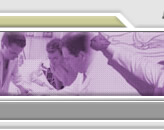



Documentation We've
all been taught the appropriate methods of charting and
documentation in school and residency. We've all be told horror
stories about docs who've been sued and lost due to poor As a resident it's easy to feel disconnected from the risks of the current medical world. You might think, "I'm in a VA system. Charting and billing don't really matter other than communicating between peers." Or perhaps you'd argue, "These aren't my patients I'm working on. I can't be sued; I'm just a resident." I don't agree with these thought processes, but I can see where a resident might feel this way. Now that I'm in practice, though, I have to be concerned about the ramifications of how I chart, not only for legal purposes but also for insurance reimbursement, not to mention reminding myself what I did for my patients at previous appointments.
The problem with our current level of documentation is that it does take extra time in your practice. My boss can see more patients than me, but he also charts less than I do (and bills less for the same services). If you're thinking of opening up a solo practice out of residency be sure to review some of the charting options like electronic medical records (EMR) vs. dictation vs. handwritten charts. Dictation's by far the fastest, but it's also the most expense. The bottom line is: know how to chart. It can be your friend or your enemy! Talk to me,
***Hospital privileges*** Is obtaining credentialing something that can be done before completion of a residency? (Do you need to have a certificate of graduation in your hands before applying to the hospitals? or is this something you can do while still in residency ...assuming you know where you're going.) And while we're at it- what about your DEA and state licensing processes? What kind of time frame do those take and what do they require in the way of training completion beyond the part III boards? Roman Burk, D.P.M. I'm a resident in Norristown, PA in a PM&S 36. I'm a 2nd-year resident and have enjoyed reading your articles. Thanks so much for helping us better understand the process!! Question: Is there anyway I can start getting privileges to hospitals in the area before I finish my residency? Could I actually apply now or at the beginning of my third year to get on insurance plans and get hospital privileges? Thanks, Editor's Response The answer to your questions is yes. You can apply for hospital privileges prior to graduation. Obviously, you'll be required to send a copy of your residency certificate once you receive it. In my case I received my residency certificate about 6 weeks after I started practicing, and I had hospital credentials prior to receiving my certificate. I'm sure it varies, but you'll start with provisional privileges which last about a year and includes the proctoring process for your surgical cases. As far as insurance, I imaging it varies by state and insurance company. In my case, as an associate, I started out billing under my boss's name and he cosigned all of my notes. My best guess for those going out into their own practice is that you'd have to at least start the application process prior to graduation or you won't be able to see any patients once you start. Maybe those in practice alone can weigh in on this question. For your DEA license, you can apply and receive it prior to starting practice. You have to have a state license (which you should apply for long before graduation) and a state controlled substance license before receiving your DEA license. I received it prior to graduation and put my home address on the license. Then, when I started practicing I changed the address to my practice address. Go to https://www.deadiversion.usdoj.gov/drugreg/index.html for the application. Use form 224. You can't use the license from a home address; it has to be your practice address, but the change of address is applied very quickly. - Jarrod
|

 documentation. Well, I'm honestly not sure just how bad it really
is. Does your professional life come to an end if you don't chart
well? Probably not. I've shadowed many an older doc who couldn't
chart to save their lives. On the other hand, what if everyone's
correct and those docs are ticking time-bombs just waiting for the
correct situation? I'd rather not find out.
documentation. Well, I'm honestly not sure just how bad it really
is. Does your professional life come to an end if you don't chart
well? Probably not. I've shadowed many an older doc who couldn't
chart to save their lives. On the other hand, what if everyone's
correct and those docs are ticking time-bombs just waiting for the
correct situation? I'd rather not find out.  Here's a small example of the importance of
documentation from the insurance standpoint: using evaluation and
management (E&M) codes. These are codes that get you paid for your
thought processes, your history and physical exam. Different levels
of codes are applied for the complexity of your H&P, and of course
higher codes pay more than the lower. If you bill a 99243 for a
consultation, your note has to reflect this level with various
bullet points. It's a bit complicated, so if you don't know this
process yet, you should learn about it before graduation. As
complicated as coding is, charting, which you're already a master
of, will allow you to bill ethically for the services you perform.
Here's a small example of the importance of
documentation from the insurance standpoint: using evaluation and
management (E&M) codes. These are codes that get you paid for your
thought processes, your history and physical exam. Different levels
of codes are applied for the complexity of your H&P, and of course
higher codes pay more than the lower. If you bill a 99243 for a
consultation, your note has to reflect this level with various
bullet points. It's a bit complicated, so if you don't know this
process yet, you should learn about it before graduation. As
complicated as coding is, charting, which you're already a master
of, will allow you to bill ethically for the services you perform.












